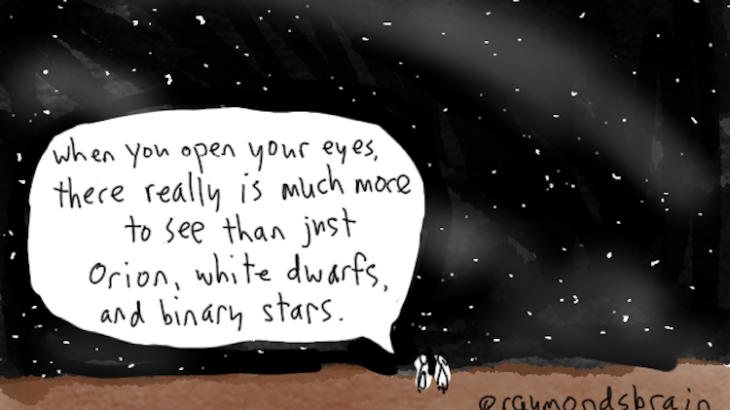Raymond K. Nakamura, Multimedia editor
“I was so proud of my public lecture. All my scientist friends say I did an excellent job. But I saw the glaze in my parents’ eyes; I missed the mark.”
– Lia Formenti, from her reflection on science communication in the McGill Space Institute’s zine.
Reflection involves describing one’s learning, how it changed, and how it might relate to future learning experiences. This practise is widespread in educational settings and includes class discussion, journals, interviews, and questioning. Yet science classes are more likely to focus on the reflection of light than reflections on learning.
Members of the Education, Public Outreach, Diversity and Inclusion (EPOD) group at the McGill Space Institute (MSI) have been reflecting on their experiences with science communication and are assembling them into a zine. Zines are informal, personal, and hand-made forms of communication. In contrast to the highly structured, objective style of scientific journal papers, zines provide a more casual medium to explore the human side of science and science communication.

Lia Formenti (she/her) is a Master’s student in particle physics at McGill University. As a public engagement volunteer and science communicator, she has noticed that her thinking about these activities has changed over time. Image provided by Lia Formenti, used with permission
I heard about the McGill zine from one of its contributors, Lia Formenti, who presented a virtual poster on the project at the online ComSciConCan conference this summer. “It’s a collection of stories from a group of people who really care about making physics and science communication a more inclusive space.”
The zine is an extension of the EPOD group’s usual activities. It runs weekly discussions for McGill university students and faculty that focus on published papers on education, equity and inclusion. The group also runs monthly Hack Sessions that involve hands-on mini-projects. This summer, they decided to try something bigger, a one-off project which became the zine. Prompts for reflection such as, “What and who is science communications for, and what and who should science communications be for?” provided the starting point for the participants.

Emma McKay (they/them) joined as co-facilitator of the EPOD group at the beginning of 2021. They think that reflecting on and talking about science and science communication are the main objective, the zine is just a vehicle for that process. Image provided by Emma McKay, used with permission
“The framework of inclusive science communication emphasises that reflexivity is crucial for the kind of change that recognizes where we all come from in order to try to get to where we want to go,” says Emma McKay. Writing (or drawing) responses may have been uncomfortable for some, but Carolina Cruz-Vinaccia says, “Learning to sit with discomfort is something we espouse as a part of EDI [equity, diversity and inclusion] work.”
In her reflection, Formenti recognized the challenges of engaging the public with the wonders of science, particularly when most of her education has focussed on developing her technical skills rather than methods of communication. “Reflecting helped me to create a vision for how I want my engagement with science communication to look.”
According to McKay, Formenti wasn’t the only one who benefitted. “Multiple people said that the process of reflecting brought things up for them that they hadn’t considered before.”
The coordinators worked to provide a valuable experience, while still producing something to share at the end. According to Cruz-Vinaccia, they are “trying to do this [this project] in a collaborative, non-hierarchical way that captures everyone’s different voices.”

Carolina Cruz-Vinaccia (she/her) is the coordinator of the McGill Space Institute. She has run a discussion group on equity and STEM education at MSI-EPOD for over three years. Image provided by Carolina Cruz-Vinaccia, used with permission
Formenti appreciated the way the project was handled. “It was a side project for all of us (mostly Physics grad students), so why rush through it? Keeping the pace comfortable made it really enjoyable.”
One of the drawbacks of this way of handling the project is that the zine has taken much longer to produce than planned.
Although the responses were specific and personal, the zine has potentially broader relevance to others working in science communications.
“The experiences we shared are more universal than we think,” Cruz-Vinaccia says. “Sharing them is crucial to foster that sense of connection and community.” McKay agrees. “I’d encourage anyone who feels drawn to considering these questions to bring them up in their social circles, or to reach out to use and build connections across the wide disconnect community of scicomm.”
Connect with the MSI-EPOD group or request a copy of the zine at epod@physics.mcgill.ca
~
Banner image by Raymond Nakamura, used with permission





You have a great site and good luck
The zine is now available. Contact them to get a copy.